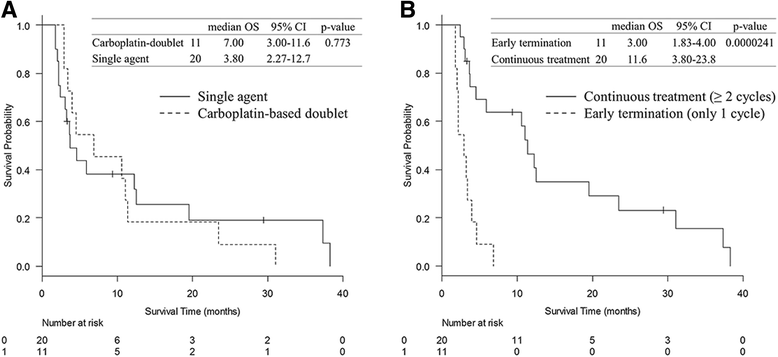Serum albumin level as a potential marker for deciding chemotherapy or best supportive care in elderly, advanced non-small cell lung cancer patients with poor performance status
- PMID: 29183294
- PMCID: PMC5704395
- DOI: 10.1186/s12885-017-3814-3
Serum albumin level as a potential marker for deciding chemotherapy or best supportive care in elderly, advanced non-small cell lung cancer patients with poor performance status
Abstract
Background: There have been few data on the chemotherapy in elderly advanced non-small cell lung cancer (NSCLC) patients with poor performance status (PS), and usefulness of chemotherapy for such patients remains unclear. The objective of this study was to identify factors that predicted the survival benefit of chemotherapy.
Methods: All consecutive elderly patients (≥75 years) with advanced NSCLC, Eastern Cooperative Oncology Group PS ≥2, EGFR mutation wild type/unknown, and newly diagnosed from January 2009 to December 2012 at a tertiary hospital were retrospectively reviewed.
Results: We enrolled 59 patients, and 31 patients received at least one chemotherapy regimen (chemotherapy group). However, 28 patients received best supportive care (BSC) alone (BSC group). The proportion of PS 2 and serum albumin levels was significantly higher in the chemotherapy group than in the BSC group. In the chemotherapy group, log-rank testing did not show statistically significant differences in overall survival (OS) between the single-agent therapy group and carboplatin-based doublet therapy group; however, the OS of patients receiving chemotherapy for only 1 cycle (early termination) was significantly shorter than patients receiving chemotherapy for ≥2 cycles. Hypoalbuminemia was not only a risk factor for the early termination of chemotherapy but also an independent prognostic factor in the chemotherapy group. A receiver operating characteristic curve analysis showed that the best cut-off value was 3.40 g/dL. In patients with serum albumin levels ≥3.40 g/dL, OS was significantly better in the chemotherapy group than in the BSC group (p = 0.0156), however, patients with serum albumin levels <3.40 g/dL exhibited poor prognosis regardless of the presence or absence of chemotherapy.
Conclusion: In the elderly NSCLC patients with poor PS, serum albumin levels may help identify certain patient populations more likely to receive a survival benefit of systemic chemotherapy.
Keywords: Albumin; Elderly; Hypoalbuminemia; Non-small cell lung cancer; Performance status.
Conflict of interest statement
Ethics approval and consent to participate
This study has been carried out in accordance with the Declaration of Helsinki. The Ethics Committee of the Kurashiki Central Hospital approved the study protocol. The Ethics Committee of the Kurashiki Central Hospital waived patient consent because this was a retrospective study and anonymity was secured.
Consent for publication
Not applicable.
Competing interests
S Ikeda, H Yoshioka, S Ikeo, M Morita, N Sone, T Niwa, A Nishiyama, T Yokoyama, A Sekine, T Ogura, and T Ishida declare that no potential conflicts of interest exist with any companies/organizations whose products or services may be discussed in this article.
Publisher’s Note
Springer Nature remains neutral with regard to jurisdictional claims in published maps and institutional affiliations.
Figures



Similar articles
-
Prognostic factors in elderly patients with advanced non-small cell lung cancer treated with first-line cisplatin-based chemotherapy: a retrospective analysis of single institution.J BUON. 2012 Jul-Sep;17(3):533-6. J BUON. 2012. PMID: 23033295
-
Decision-making factors for best supportive care alone and prognostic factors after best supportive care in non-small cell lung cancer patients.Sci Rep. 2019 Dec 27;9(1):19872. doi: 10.1038/s41598-019-56431-w. Sci Rep. 2019. PMID: 31882700 Free PMC article.
-
Evaluation of the efficacy and safety of chemotherapy for patients with wet stage IIIB/IV non-small-cell lung cancer aged 80 years old or more.Lung Cancer. 2011 Feb;71(2):173-7. doi: 10.1016/j.lungcan.2010.05.014. Epub 2010 Jun 8. Lung Cancer. 2011. PMID: 20570388
-
Excision repair cross-complementation group 1 (ERCC1) in platinum-based treatment of non-small cell lung cancer with special emphasis on carboplatin: a review of current literature.Lung Cancer. 2009 May;64(2):131-9. doi: 10.1016/j.lungcan.2008.08.006. Epub 2008 Sep 19. Lung Cancer. 2009. PMID: 18804893 Review.
-
[Recent topics in chemotherapy for elderly patients with lung cancer].Gan To Kagaku Ryoho. 2000 Jul;27(8):1097-104. Gan To Kagaku Ryoho. 2000. PMID: 10945002 Review. Japanese.
Cited by
-
Integrating clinical features with genetic factors enhances survival prediction for adults with acute myeloid leukemia.Blood Adv. 2020 May 26;4(10):2339-2350. doi: 10.1182/bloodadvances.2019001419. Blood Adv. 2020. PMID: 32453839 Free PMC article.
-
Immune-Checkpoint Inhibitors for Malignant Pleural Mesothelioma: A French, Multicenter, Retrospective Real-World Study.Cancers (Basel). 2022 Mar 15;14(6):1498. doi: 10.3390/cancers14061498. Cancers (Basel). 2022. PMID: 35326648 Free PMC article.
-
Analysis of the treatment efficacy and prognostic factors of PD-1/PD-L1 inhibitors for advanced gastric or gastroesophageal junction cancer: a multicenter, retrospective clinical study.Front Immunol. 2024 Oct 24;15:1468342. doi: 10.3389/fimmu.2024.1468342. eCollection 2024. Front Immunol. 2024. PMID: 39512347 Free PMC article.
-
Nanoliposomal irinotecan with fluorouracil and folinic acid, FOLFIRINOX, and S-1 as second-line treatment for unresectable pancreatic cancer after gemcitabine/nab-paclitaxel.Sci Rep. 2024 Jul 23;14(1):16906. doi: 10.1038/s41598-024-65689-8. Sci Rep. 2024. PMID: 39043707 Free PMC article.
-
Preoperative albumin-to-globulin ratio and prognostic nutritional index predict the prognosis of colorectal cancer: a retrospective study.Sci Rep. 2023 Oct 12;13(1):17272. doi: 10.1038/s41598-023-43391-5. Sci Rep. 2023. PMID: 37828259 Free PMC article. Review.
References
-
- Altekruse S, Kosary S, Krapcho M, et al: SEER cancer statistics review, 1975–2007. http://seer.cancer.gov/archive/csr/1975_2007/
MeSH terms
Substances
LinkOut - more resources
Full Text Sources
Other Literature Sources
Medical
Research Materials
Miscellaneous

